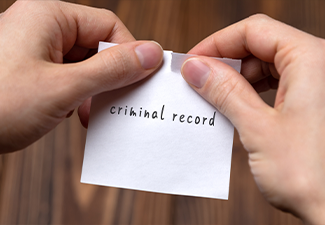What Are the Steps to Get a Criminal Record Expunged in Missouri?
March 10, 2025
 A criminal record can create obstacles when applying for jobs, housing, or educational opportunities. Missouri law allows individuals to seek expungement for eligible offenses, giving them a fresh start. This legal process removes records from public view, helping people move forward without past convictions holding them back.
A criminal record can create obstacles when applying for jobs, housing, or educational opportunities. Missouri law allows individuals to seek expungement for eligible offenses, giving them a fresh start. This legal process removes records from public view, helping people move forward without past convictions holding them back.
Expungement laws in Missouri have evolved over time, expanding the number of offenses that qualify. The state’s updated laws reflect an understanding that many individuals deserve second chances, particularly those who have demonstrated rehabilitation.
A successful expungement can make it easier to reintegrate into society and gain access to better opportunities. How should you go about the process of expunging your criminal record? The Hardin Law Firm, serving clients in St. Louis, Missouri, can help. Understanding the process and the legal steps involved can help those looking to clear their records.
Determine Eligibility for Expungement
Not all offenses qualify for expungement. Missouri law provides specific guidelines on which crimes can be removed from a person’s record. To determine eligibility for citizens, courts will consider several factors, such as:
Eligible offenses: Many misdemeanors, non-violent felonies, and certain municipal offenses may be expunged.
Ineligible offenses: Violent crimes, sex offenses, Class A felonies, and repeat DUI offenses generally can’t be expunged.
Waiting period: Most misdemeanors require a three-year waiting period, while felonies typically require seven years before filing for expungement.
No pending charges: The individual must not have any pending criminal charges or subsequent convictions.
Financial obligations: All fines, court costs, and restitution related to the conviction must be paid in full.
Good conduct: Judges often look favorably upon individuals who have demonstrated responsible behavior following their conviction.
Gather Required Documents
Once eligibility is confirmed, the next step involves gathering the necessary paperwork. It’s important to verify that you have all of the necessary documents that’ll aid your case for expungement. Some of the required documents typically include:
A certified copy of the conviction or arrest record
Court documents showing completed probation or sentence requirements
Proof of payment for all fines and restitution
Character references or proof of rehabilitation (if applicable)
Employment records or proof of efforts to secure steady work
Certificates from rehabilitation programs, community service, or educational courses
Having these documents ready can prevent delays in the filing process. Courts prefer thorough applications with all required paperwork to expedite decisions.
File a Petition for Expungement
The formal process begins by filing a petition in the court where the original case was handled. The petition must include:
The petitioner’s full name, date of birth, and contact information
Details of the offense, including the case number and date of conviction
A statement explaining how expungement would benefit the petitioner
Documentation supporting the request, such as evidence of good conduct or employment difficulties due to the record
Any relevant documentation proving positive contributions to the community
The court requires a filing fee, though fee waivers may be available for those who qualify. It’s recommended to review court requirements in advance to avoid unnecessary delays.
Notify Interested Parties
After filing the petition, the petitioner must serve copies to all relevant parties. Some of the parties that may be contacted can possibly include:
The prosecuting attorney’s office
Law enforcement agencies involved in the original case
The Missouri State Highway Patrol, which maintains criminal records
Any victims involved in the case, if applicable
These entities have an opportunity to object to the expungement. If objections arise, the court may schedule a hearing to address concerns. It’s beneficial to prepare a response to any potential objections in advance.
Attend the Court Hearing
In some cases, the court may require a hearing before approving an expungement request. During the hearing, the judge will consider factors such as:
The nature of the offense
The time elapsed since the conviction
Evidence of rehabilitation
Any objections raised by prosecutors or law enforcement
The petitioner’s overall behavior since the conviction
The impact of the conviction on employment and personal life
Petitioners should present a strong case demonstrating how expungement would positively impact their lives. Legal representation can be beneficial in preparing for and arguing the case in court. An experienced attorney can help articulate why expungement is justified.
Receive the Judge’s Decision
After reviewing the petition and hearing any arguments, the judge will issue a ruling. That’s the final step of the expungement process and where it’s determined if you’re eligible for expungement. If the expungement is granted, several things will occur after.
The Missouri State Highway Patrol will remove the record from public databases.
The individual can legally state that the conviction didn’t occur in most situations.
Background checks conducted by most employers and landlords will no longer show the expunged record.
Certain rights, such as firearm ownership and eligibility for professional licensing, may be restored.
Expungement doesn’t apply to federal agencies or private databases that maintain independent records, so it’s advisable to verify the full scope of the expungement’s impact.
If the petition is denied, the court may provide reasons for the decision and indicate whether the individual can reapply at a later date. In some cases, appealing the decision or refining the petition may be possible.
Benefits of Expungement
Expunging a criminal record can provide numerous benefits, including:
Better job opportunities: Many employers conduct background checks, and a clean record increases hiring chances.
Improved housing prospects: Landlords often screen applicants for criminal history.
Restoration of rights: Some rights, such as firearm ownership or professional licensing, may be restored after expungement.
Peace of mind: Knowing that past mistakes no longer define one’s future can offer relief and confidence.
Educational and financial aid opportunities: Some scholarships and financial aid options become available after expungement.
If you’re interested in experiencing these benefits, working with an experienced attorney will give you the best chance of a successful expungement.
How The Hardin Law Firm Can Help
Expungement offers a fresh start for individuals burdened by past convictions. Missouri law provides a path to clear certain records, allowing people to pursue opportunities without past mistakes affecting their future. Understanding the eligibility requirements, filing process, and benefits of expungement can help those seeking to rebuild their lives.
The process of expungement involves legal steps that must be handled correctly to achieve a favorable outcome. My firm, The Hardin Law Firm, has experience assisting Missouri residents with clearing their records. I’ve helped clients with the expungement process for years. I can provide guidance with:
Determining eligibility for expungement
Gathering necessary documentation
Preparing and filing petitions with the court
Representing clients at hearings if required
Addressing any legal challenges that arise during the process
Guiding clients through the process with personalized legal advice
Legal guidance can make the difference between a successful expungement and continued legal barriers. Having experienced legal representation increases the likelihood of a smooth and favorable outcome.
Contact The Hardin Law Firm Today
For individuals considering expungement, working with a knowledgeable lawyer such as myself can simplify the process and improve the likelihood of success. The Hardin Law Firm is committed to helping clients in St. Louis County, Missouri, and the surrounding areas take this important step toward a brighter future.
Clearing a criminal record can open doors to new employment, education, and personal growth. Contact me today to schedule your appointment.
